#Jacob Nayinggal Junior
Photo
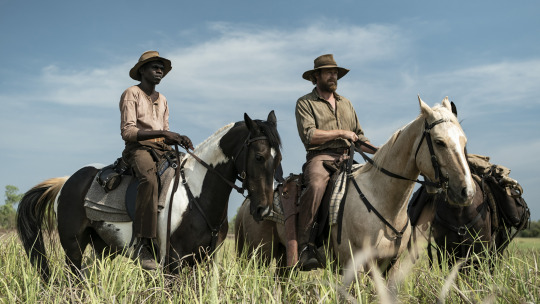
High Ground.
Australian director Stephen Maxwell Johnson tells Letterboxd’s Indigenous correspondent Leo Koziol about his revisionist new meat-pie Western High Ground, working in a ‘both-ways’ style, and how he approaches the question of story sovereignty.
“Maybe we’re all feeling a little more vulnerable, a little more open to thinking about who the fuck we all are in this world.” —Stephen Maxwell Johnson
Note: this interview may contain images and stories of people who have passed away.
Not every Western has a ‘Croc Spotter’ in its production credits, but Australian Westerns are in a league of their own. The genre has long been a staple of Australian cinema; the world’s first narrative feature film is considered to be Charles Tait’s 1906 bushranger yarn about the Kelly Gang. While the likes of outlaw Ned Kelly have made good Western fodder for more than a century now, recent entries in the sub-genre—known colloquially as meat-pie Westerns—are starting to look a little longer and harder at the relationship between British colonizers and the Indigenous peoples of the Great Southern Land.
This year brings two such tales: Leah Purcell’s feminist western The Drover’s Wife: The Legend of Molly Johnson, which made our Best of SXSW 2021 list, and Stephen Maxwell Johnson’s High Ground, which was executive produced by a community of Aboriginal activists, including Witiyana Marika, one of the founding members of groundbreaking Aboriginal band Yothu Yindi. (Marika is also in the film as tribal elder, Grandfather Dharrpa, taking on a role that was intended for Aboriginal great David Gulpilil, who has retired from acting due to ill health.)
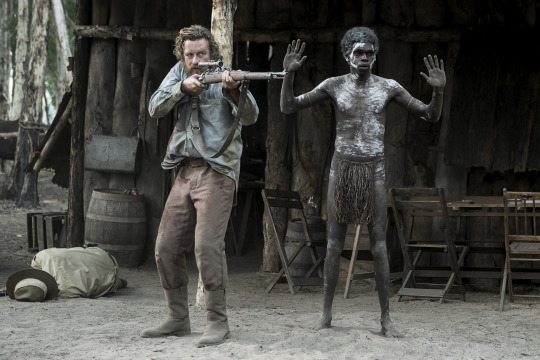
Simon Baker as Travis and Jacob Nayinggal Junior as Gutjuk.
Set in Australia post World War I, and based on true stories told by the traditional inhabitants of Arnhem Land, in north-eastern Australia, High Ground opens with—content warning—a brutal massacre by white Australian police of an Indigenous family. The story soon pairs Gutjuk (Jacob Nayinggal Junior, in his impressive screen debut) with bounty hunter Travis (heart-throb Simon Baker, in gnarly outback mode) in a manhunt that brings the opposing forces of colonizers and inhabitants to a head.
Nayinggal Junior, the grandson of Arnhem Land traditional owner Jacob Nayinggal, was not yet born when Johnson, who is a white Australian, began the long process of developing High Ground with his Indigenous partners, whose oral histories informed the film’s plot. Johnson’s connection to Yothu Yindi and his partners’ community goes back over 30 years; he directed the original music video for the band’s 1991 international hit ‘Treaty’, the first Indigenous-language song to chart prominently in Australia.
This is Johnson’s second feature film connected to the Yolngu communities in north-eastern Australia; the first, Yolngu Boy, is a coming-of-age story of three young friends on a journey to Darwin after one of the boys lands in trouble. It has been twenty years since that debut, and High Ground has been a labor of love in the time since.
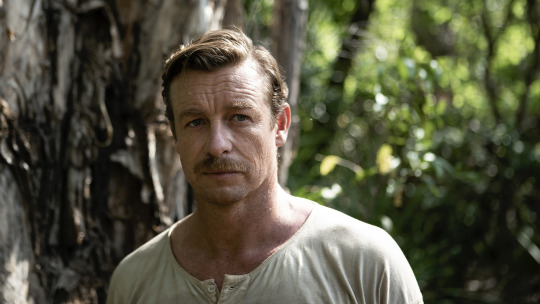
Simon Baker in ‘High Ground’.
The film takes its sound design from the land and its inhabitants, turning the volume up on birds, insects, snakes, gunshots and Aboriginal song. Expansive cinematography makes sure to place characters within the context of their surrounds—a constant reminder that the land is bigger than anything happening on it. “Brutal in all the right ways, and as honest as an Australian colonial Western should be,” writes Coffeenurse. “It’s really something how the Australian Western has become the way for Australian cinema to explore the weight of colonialism and imperialism in our history and culture,” agrees Smoothjazzlord. “Stephen Johnson doesn’t shy away from complexity and I appreciate that,” writes TheEllamo.
I spoke to Johnson at length about his “both-ways” journey of bringing the film to the screen through collective research, song and storytelling.
Notes: ‘Blackfella’ and ‘whitefella’ are informal, self-descriptive terms often used by Indigenous and Aboriginal Australians and their friends. Johnson makes several references to ‘makaratta’, an intricate Yolngu term that describes the process of coming together to face wrongs, reconcile and make peace, and to ‘Country’, which is an Indigenous colloquialism describing one’s association with one’s own land and family.
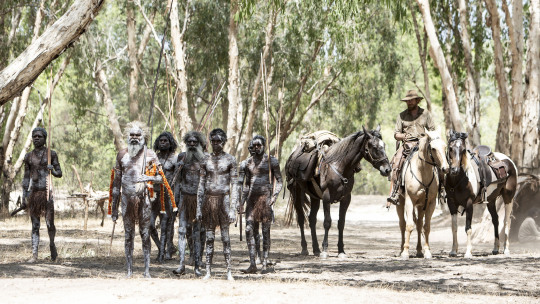
Witiyana Marika (second from left) and Simon Baker (on horse) with Yolngu cast members.
Tell us how the story of High Ground came about.
Stephen Maxwell Johnson: I was very fortunate in my life to have had two parents who explored the world. I grew up in the Bahama Islands, in Africa and they came to northern Australia. My father was an educator of the Yolngu people, and really, my friendships and my associations in my life have been about growing up with Indigenous cultures and people.
I've never really been disconnected from that, and the stories I grew up with—things I’ve heard, ceremonies I’ve seen—were very much a part of my education. I went to school and the stories I’m hearing, all the whitefella stories about Captain Cook and the invasion and what happened, no one ever wanted to go any deeper or open a story book to where it all began, and how old it actually all is.
As you know, it’s the oldest living culture on Earth, it’s an amazing connection to Country and the stories and the songlines. So, we came together, we made a decision to tell a story of the resistance that became High Ground, over many years sitting on Country with old men and women and family and drawing inspiration from true stories and true characters, then putting together what was obviously a fiction (but so is history).
It was about wanting to tell a deeper truth, but to create a film that was entertaining, so it really drew you in, and allowed you to come out the other end to perhaps reflect and rethink the Australia story, and, really, the greater human story about who we all are.
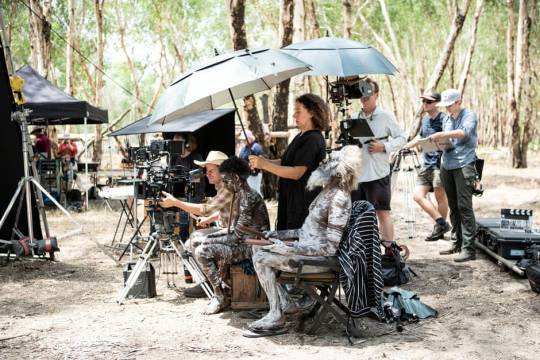
Witiyana Marika (front, seated) on the set of ‘High Ground’.
A unique aspect of your film is that Yothu Yindi band member Witiyana Marika is a producer. How did you connect with Yothu Yindi and establish those friendships?
Well, I did pretty much all of the Yothu Yindi stuff, I made ‘Treaty’ and ‘Djäpana’ and all those clips that the band did. I directed and photographed all of that stuff. For many years, anything that was Yothu Yindi, I was there doing it. Witiyana and Mandawuy [late Yothu Yindi frontman Dr. Mandawuy Yunupingu] were two of my dearest, dearest friends—my father actually knew Mandawuy back in school days, so there’s a deep and long connection there. Witiyana picked up the mantle after Mandawuy passed away. It even goes back further than that, to discussions with old man Bill Neidjie and Jacob Nayinggal, who sort of drew up the battle lines and helped create Kakadu [National Park].
Jacob Junior Nayinggal, he’s been born and became the lead actor; his grandfather would be so pleased that his grandson ended up being the lead actor in this film. ’Cause it was always about getting a Yolngu hero leading the story of the resistance, which was what it was called back in the day.
It’s really been a both-ways journey. That’s what everything that Yothu Yindi sang about, was that idea of bridging between two cultures, that idea of coming together and sharing knowledge and respecting each other. That balance—makaratta. That’s been my journey. That is the journey.
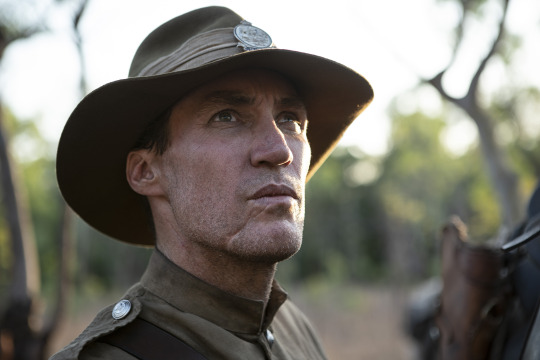
Callan Mulvey as Ambrose in ‘High Ground’.
A big issue for people in the Indigenous film community is storytelling sovereignty: “nothing about us without us”. Do you feel that the community working closely with you to make this film meant that you were telling their story in the way they wanted it seen and heard?
Well if you have a look at the credits it sort of says a lot about the process. Twenty years working together. As I said to you, I don’t see myself as a whitefella over here and they’re blackfellas over there, I see [us] as being human. They’ve been my dearest and closest friends all my life. This is us sitting down, together. Listening. Learning both ways. Bridging the gap and wanting to tell the bigger story about this country.
In this country there’s a very big story to be told. It has two different perspectives and it was about getting that right and spending the time together right. It is very much a Yolngu story; everything has been meticulously researched, and spoken about, and sung. The producers, the executive producers, all the creators in the film are predominantly Yolngu people, right across. Everything is ultimately connected and it is very much the voice of this land that we wanted to shine through in the story of High Ground.
That sort of thing came back in the day, when I made ‘Treaty’: “What’s a whitefella telling [our story]?” Are you kidding me? Mandawuy had the same reaction, he said “We’re doing this together”. Christ almighty we’ve known each other for a lifetime and we’re working together creating and telling stories. There you go. Simple as that. If anyone’s got a problem with that then I think they’re the one with the problem.
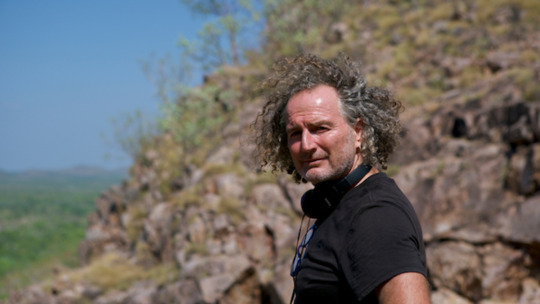
‘High Ground’ director Stephen Maxwell Johnson.
Certainly, Yothu Yindi itself was comprised of both blackfella members and non-blackfellas.
Exactly. Exactly. Look. I’ve grown up with blackfellas from right across Arnhem Land, and it’s been nothing but a deep and beautiful, profound friendship. I’ve never seen it as me and them. We’re just humans. We are one. We share, we care, we love, we laugh. There is so much to be learned from the ancient culture of this country. And the land and the language and the people.
It’s a beautiful thing having that kind of connection and immersion in that world. And that’s been my life story. I’ve been very fortunate to have had that. A lot of people don’t get that experience… being able to work so closely and so deeply with my friends—and family; I was adopted in, as well.
And can I tell you, every single person in Arnhem Land is so proud of this film, it is their film. Their story. It’s been their creative process as well. Every person who is involved in the crew and the journey of the film has had a life-changing experience, for the better. We just hope that the film and the story do help contribute to that bigger conversation, that idea of makaratta and sorting out the shit and getting on with a bit of truth telling.
How was the reaction in the Aboriginal community? Have you had the opportunity to take the film back to the people in Arnhem Land, to have screenings there?
First thing we did. With the elders, that’s what we all planned. They said, “right, as soon as we’ve done this, the first thing we’re going to do, we’re going to bring this back to the families and show it to the families first.” And that’s precisely what we did; we took a big screen out into Arnhem Land, and put it out in the bush, for the families to watch. It was an amazing experience.
Let me tell you, the screams and the applause, and the laughter and the tears, when they saw the film, on their Country. Their film. Their story. Obviously they can listen to the language and the songlines in the film in a completely different way. It was beautiful. I almost couldn’t stop crying. That sense of pride that everyone had in the film, they just own it. It’s theirs and it’s everyone’s. It’s a beautiful way to create something.

The community screening of ‘High Ground’ on the Gunbalanya football field in West Arnhem Land, Australia.
Did you manage to have those screenings happen before Covid-19?
Well, no. The Northern Territories, as you know, was clear. I had to go into quarantine and once the Arnhem Land bio-zone was relieved just a little bit, we took the film out. We had to hit the pause button with Covid, but [then] we did it. People just drove, and flew, and walked from hundreds of miles to come to the place where we blew up the screen and projected the light.
That’s a wonderful story. What’s the reaction been from mainstream Australia?
Look, very, very good. [The film’s distributor] Madman said it made double what [they] thought it would in box office. I think we were fortunate maybe in some respects coming on the back of Covid-19. Maybe we’re all feeling a little more vulnerable, a little more open to thinking about who the fuck we all are in this world. There is this kind of turning of the tide, now, of people and of a new generation wanting to learn and understand about our connection to Country.
We’re blessed with, you know, what we have right here. We need to nurture it, take care of it, respect it, celebrate it, dance it, sing it, talk it. It’s a beautiful thing to be able to tap into.
Thank you Stephen so much for your time. I just want to say I was thoroughly engrossed by your film. It was powerful, it was important. I found particularly the scene in the middle, where a Treaty signing was hinted at: that would have been a cathartic moment for the people of Arnhem Land? To think ‘that could have been what our people had done in the 1930s’, instead of the lack of a Treaty, which Australia has never had. All power to you and everything you’ve done.
That’s beautiful mate, and I will say, just one lovely parting thought here, you know yes, it’s my work, but honestly it’s such a team effort. Such trust, such great friendships and collaborations to create something like this. It’s no one fella’s effort, it’s an incredible team effort.
Related content
Meat-Pie Westerns, Kangaroo Westerns, Australian Westerns: a Letterboxd HQ list
Always Was, Always Will Be, Aboriginal Land: Troy’s list of the best of Aboriginal and Torres Strait Islander “Australia” in film and television
Australian Aboriginal Movies: an extensive list by Wayne
Australian Films Worth Your Time: Jacob’s list of Ocker cinema
My Name is David Gulpilil: Molly Reynolds’ new film celebrating the actor’s extraordinary life
Follow Leo on Letterboxd
‘High Ground’ is available now on digital and VOD via Samuel Goldwyn Films.
#high ground#stephen maxwell johnson#simon baker#callan mulvey#australian cinema#australian film#torres strait islanders#aboriginal and torres strait#aboriginal#aborigine#aboriginal film#northern territory#arnhem land#yolngu#witiyana marika#Jacob Nayinggal Junior#yothu yindi#indigenous film#indigenous cinema#letterboxd#western#meat pie western#kangaroon western#australian western
25 notes
·
View notes